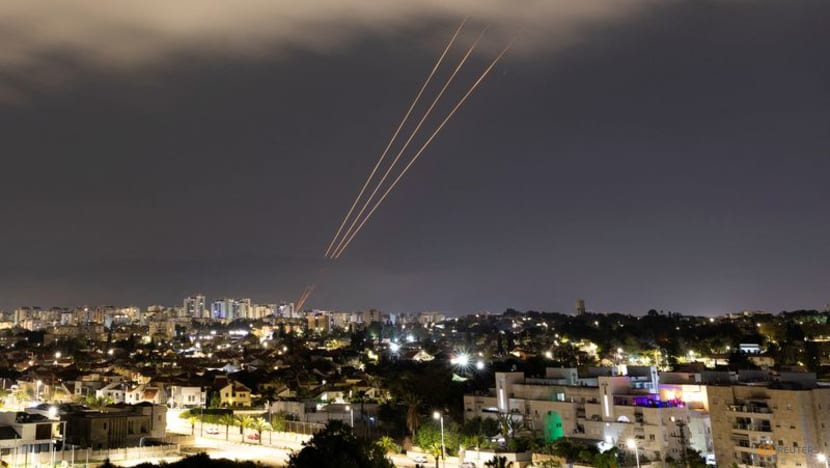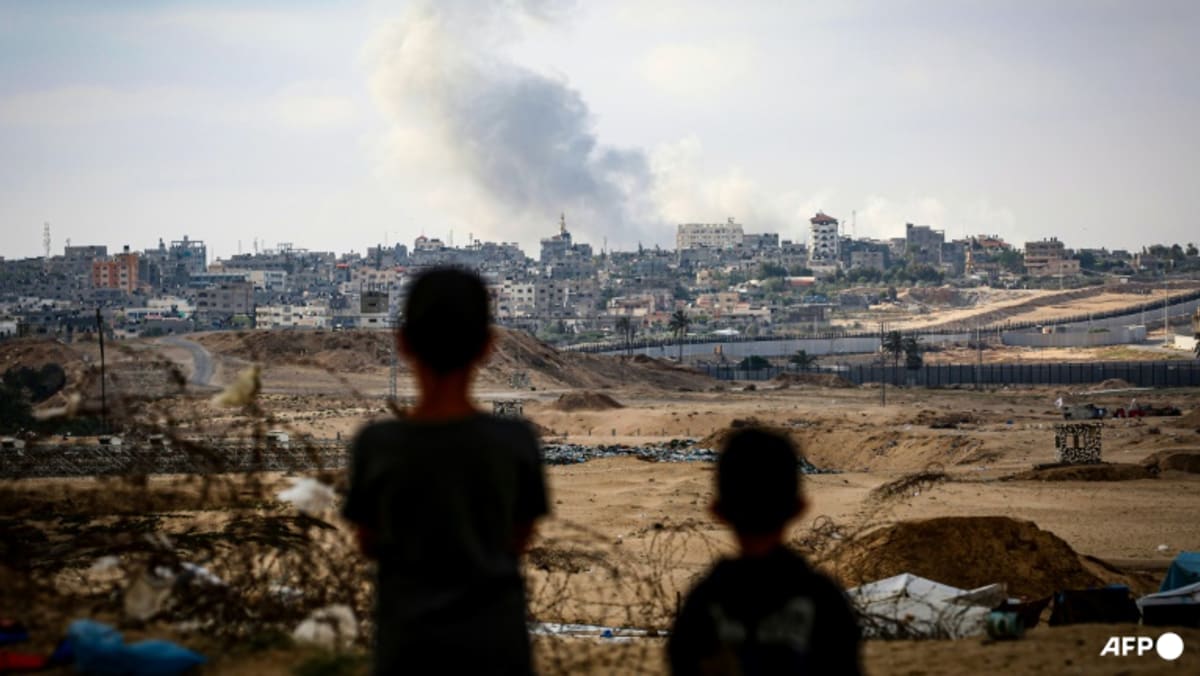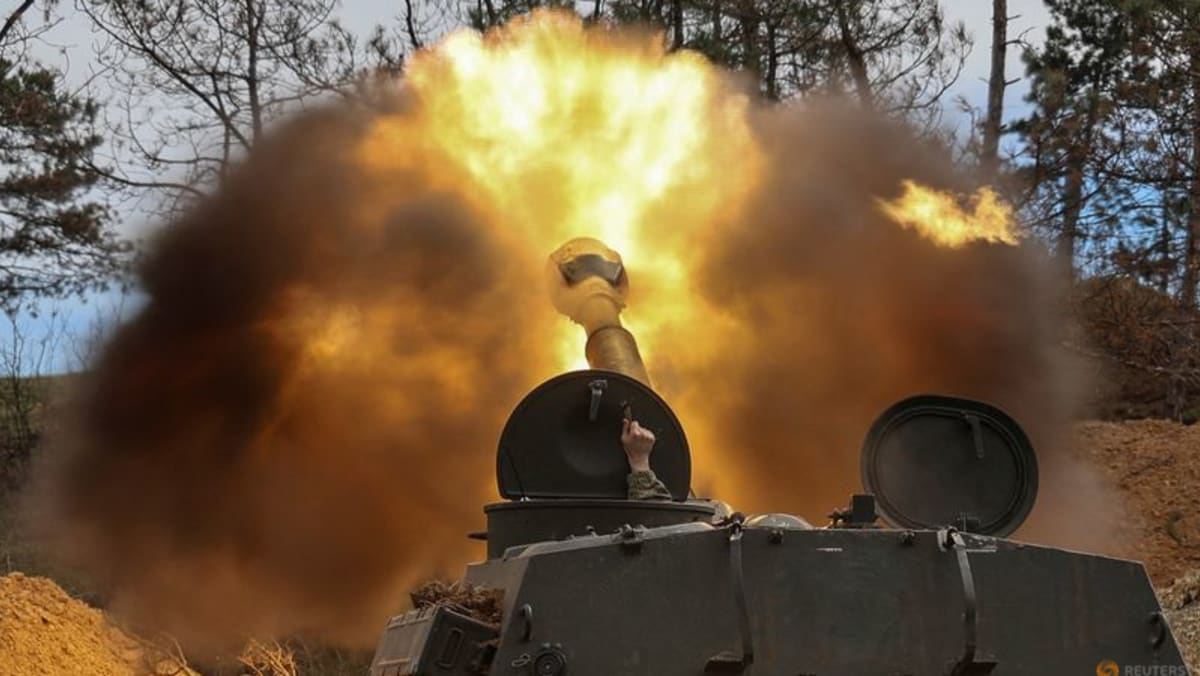Iran fired more than 300 missiles and drones at Israel on Apr 13 in a retaliatory attack. Analysts tell CNA how this could further unfold, and what the potential impact of the assault is.

An anti-missile system operates after Iran launched drones and missiles towards Israel, as seen from Ashkelon, Israel, Apr 14, 2024. (Photo: REUTERS/Amir Cohen)
New: You can now listen to articles.

Sorry, the audio is unavailable right now. Please try again later.
This audio is AI-generated.
Over the weekend, Iran launched an unprecedented drone and missile attack on Israel, sparking fears of a broader conflict in the Middle East and marking a major escalation of the long-running covert war between both countries.
What happened?
On late Saturday (Apr 13), Iran fired more than 300 missiles and drones at Israel in its first-ever direct assault on Israeli territory.
While most of the weapons were downed before reaching Israel, a young Israeli village girl was critically injured after being hit by shrapnel in her home.
The attack caused only modest damage to infrastructure. The missiles and drones had been shot down by Israel's Iron Dome defence system and with help from the United States, Britain and Jordan.
An air force base in southern Israel was hit but continued to operate as normal. There were no other reports of serious damage.
Iran’s Foreign Minister Hossein Amirabdollahian said Iran had given neighbouring countries – as well as Israel's key ally, the US – 72 hours' notice that it would launch the strikes, a move that would have enabled them to largely thwart the attack.
Why did Iran do this?
Iran said its assault was in retaliation for a strike on its embassy in Syria’s capital Damascus on Apr 1.
Israel is suspected to be behind the strike which killed seven Iranian Revolutionary Guards who were there for a meeting, including two senior generals, but it did not claim responsibility for the strike.
The strike also followed months of clashes between Israel and Iran’s regional allies, triggered by the war in Gaza between Israel and Palestinian militant group Hamas, which is backed by Iran.
Iran’s supreme leader, Ayatollah Ali Khamenei, then said Israel "must be punished and shall be" for an operation he said was equivalent to an attack on Iranian soil.
Mr Jonathan Panikoff, director of the Atlantic Council’s Scowcroft Middle East Security Initiative, told CNA’s Asia First that Iran “is really seeking to restore deterrence”.
Apart from the Damascus strike, Israel has been blamed for assassinating Iranian nuclear scientists since 2010 in efforts to sabotage Iran’s nuclear energy ambitions. Most recently, in 2020, Iran’s most senior nuclear scientist was killed during a road ambush near Tehran.
Mr Panikoff said: “I think the Iranians were fed up and said, ‘Look, we have to put an end to this … We need to do something that’s actually bigger, that’s not asymmetric or terrorist by attacking an Israeli embassy, say, in Southeast Asia.’
“‘We really need to do something direct and try to demonstrate to Israel we have these capabilities. We are going to use them if you don't stop doing this’,” Mr Panikoff added.
As for why Iran had warned about its attack in advance, Dr Simon Pratt, a political science lecturer at the University of Melbourne, said he was unsure Iran had the ability to conceal its preparations anyway.
“It might as well telegraph it and act as though it’s a strategic plan all along,” Dr Pratt told CNA938.
The fact that Iran used slow-moving Shahed drones means it anticipated most of the projectiles would be shot down as well, he added.
“Iran would have made it really clear that this strike is not the opening stages of a much larger war – that this is going to be kind of one-and-done.”
How has Israel responded so far?
Following Saturday’s attack, Israel’s war cabinet minister Benny Gantz said on Sunday that it would exact a price from Iran when the timing is right.
"We will build a regional coalition and exact the price from Iran in the fashion and timing that is right for us," he said in a statement as the Israeli war Cabinet was due to convene to discuss Israel's response to Iran's attack.
Israel’s defence minister Yoav Gallant also said the country had an opportunity to form a strategic alliance against Iran.
After the meeting, Israeli officers said the five-member war Cabinet favoured retaliation but were divided over the timing and scale of any such response.
At an emergency meeting of the United Nations’ Security Council on Sunday, Israel and Iran accused each other of being the main threat to peace in the Middle East.
How have Israel’s allies and the world reacted?
The US will not support or take part in any counterattack against Iran, US President Joe Biden told Israel’s Prime Minister Benjamin Netanyahu.
The US will continue to help Israel defend itself but it does not want war, White House national security spokesman John Kirby told ABC's "This Week" program on Sunday.
Jordan's King Abdullah told Mr Biden in a phone call on Sunday that any further escalation from Israel would widen the conflict in the region, Jordanian state media reported.
Russia, China, France and Germany, as well as Arab states Egypt, Qatar, Turkey and the United Arab Emirates, have urged restraint.
Leaders of the Group of 7 nations condemned Iran's attack and said they would work to stabilise the situation, warning in a statement that Tehran risked "an uncontrollable regional escalation".
Italy, which holds the rotating presidency of the G7, had called a meeting of G7 heads after Mr Biden pledged a coordinated diplomatic response to Iran’s attack.
The G7 comprises the US, Canada, Italy, Britain, France, Germany and Japan, as well as the European Union.
UN Secretary-General Antonio Guterres on Sunday similarly called for maximum restraint, issuing a reminder that acts of reprisal involving the use of force are barred under international law.
Mr Guterres earlier condemned Iran’s attack, saying he was “deeply alarmed about the very real danger of a devastating region-wide escalation".
Singapore too, has condemned the attack and called on all parties to “exercise maximum restraint and avoid escalatory actions”.
How could Israel respond in the future?
Experts said that Israel will certainly respond but likely in a measured fashion, given the pressure that its allies have put it under.
Mr Ryan Bohl, senior Middle East and North Africa analyst at RANE, told CNA’s Asia First that Israel could launch a symbolic response, such as striking large unoccupied sites or locations within Iran that are not strategically important to Iran’s government.
Mr Bohl pointed out that Israel is under enormous diplomatic pressure from the US not to destabilise the region.
“That could provoke this tit for tat, missile-and-drone cycle that we're starting to see evolve,” he added.
“For that matter, it’s not exactly in Israel's interest to get stuck in that cycle either because we’ve seen in the region already, the US is carrying out this open-ended campaign against the Houthis in Yemen, and they don’t really have an exit strategy there.”
He noted that because Iran is “much bigger” and “much more capable”, its assaults will almost certainly get past Israeli air defences and cause significant civilian and military casualties if the two regional foes do enter a back-and-forth escalation.
Dr Pratt also said a lot depends on the pressure that the Biden administration puts on Mr Netanyahu and the Israeli government.
“I don’t think it’s yet time to panic, but the possibility of an escalation certainly is there,” he added.
“If we’re talking about limited retaliation within Israel, we could see things like escalated Israeli strikes on Iranian proxies, more intense bombings of Hezbollah positions or more strikes in Damascus.”
Dr Pratt further flagged the possibility of direct strikes by Israel on Iranian military assets, though he said this was a less probable outcome.
Nevertheless, Mr Bohl warned of a “strong risk” that Israel and Iran will strike each other “more and more overtly”. He added that as both countries do not share a border, this could echo the Russia-Ukraine war where both sides have been going deeper and deeper into each other’s territories.
On the other hand, Mr Panikoff said if Israel’s leaders can be convinced not to take military action, they could launch something in the clandestine realm.
These include cyberattacks, as well as attacks against Iran’s facilities that have been encouraging malign influence throughout the region from the Islamic Revolutionary Guard Corps.
How could Iran and its “Axis of Resistance” respond?
Several groups call themselves the “Axis of Resistance” to Israeli and American influence in the Middle East.
This so-called “Axis of Resistance” is led by Iran and includes Hamas; the Hezbollah movement in Lebanon; and the Houthi movement in Yemen.
Mr Bohl said many have political incentives to continue attacking Israel as well as the powers that are seen backing Israel, such as the US.
“Those political drivers are why they're doing what they're doing. They're gaining credibility on the ground, and most of them come from systems where there are no elections for them to restore their legitimacy, so this is one of their most effective ways to win back support,” Mr Bohl added.
What does this mean for the Israel-Hamas war?
Hamas would benefit if Israel and Iran entered a war, said Dr Pratt.
He noted that the militant group has consistently tried to draw Iran into the Israel-Hamas conflict, hoping that a “regional constellation of allies would initiate hostilities with Israel” in support of Hamas’ Oct 7, 2023 attack on Israel. However, Iran’s response has been “quite muted”.
“For Hamas, it would be very good if Israel and Iran started a war with one another because currently, what they have seen will be disappointing,” said Dr Pratt, referencing how Iran had telegraphed its strike on Israel in advance.
He added: “I don't know what they can do to capitalise on this, other than trying to keep the pressure up and trying to keep the global public from forgetting that the Gaza war is still ongoing.”
What is the potential impact beyond war and conflict?
An Iran-Israel war could further threaten peace and security, and governments will be looking at how to respond to a variety of scenarios, said Dr James Dorsey, adjunct senior fellow from Singapore’s S Rajaratnam School of International Studies.
"An all-out war is going to heighten emotions, particularly in Muslim majority countries across the globe but, obviously for Singapore, among its neighbours, Malaysia and Indonesia,” Dr Dorsey told CNA.
“And of course, even though Singapore has been very good in managing emotions in Singapore, it does affect various minority communities, whether those are Muslims or Jews."
Separately, on Monday, Asian shares slumped and gold prices rose in the wake of Iran’s attack.
Shipping costs are also expected to go up due to delays from closed airspace, limited shipping routes, and rising fuel charges.
Consumers can expect to pay up to 45 per cent more for freight services if tensions escalate, said AOCL (Singapore)’s general manager Sarah Mangeet Kaur.
The cost of shipping a container has more than doubled from US$2,000 two months ago to US$4,800 now, thanks to longer sea routes.
Escalating tensions could also push gold prices even further, even as prices have continued to climb to record highs in recent times as investors seek refuge in the precious metal.
Gold is seen as a safe haven amid a rise in demand for alternatives to risk assets, such as cryptocurrency.
Ms Angela Lam, director of Arthesdam Jewellery in Singapore, said high prices are expected to hold in the long term if the Middle East situation continues to evolve.
Want an issue or topic explained? Email us at digitalnews [at] mediacorp.com.sg. Your question might become a story on our site.













 English (US) ·
English (US) ·  Turkish (TR) ·
Turkish (TR) ·